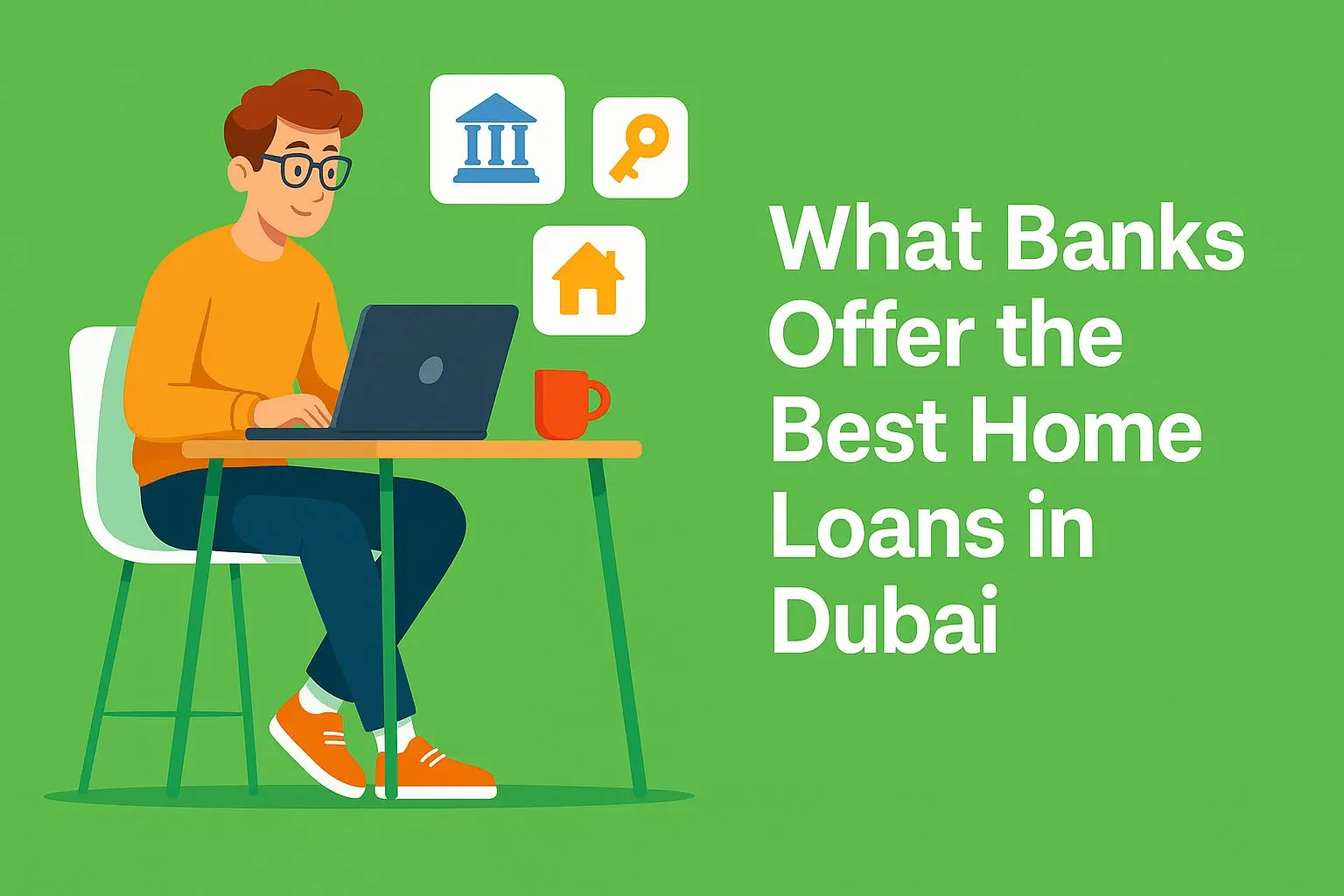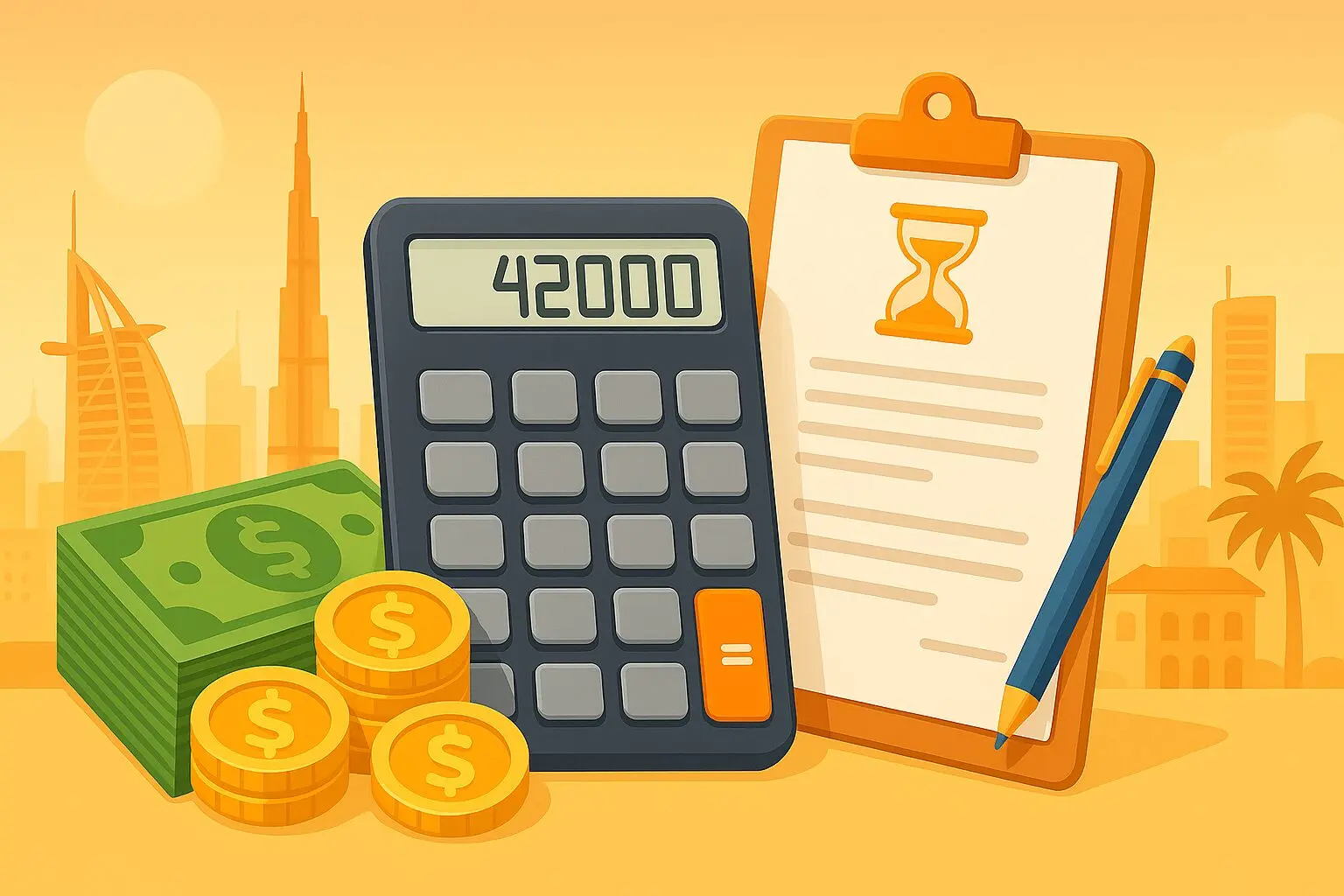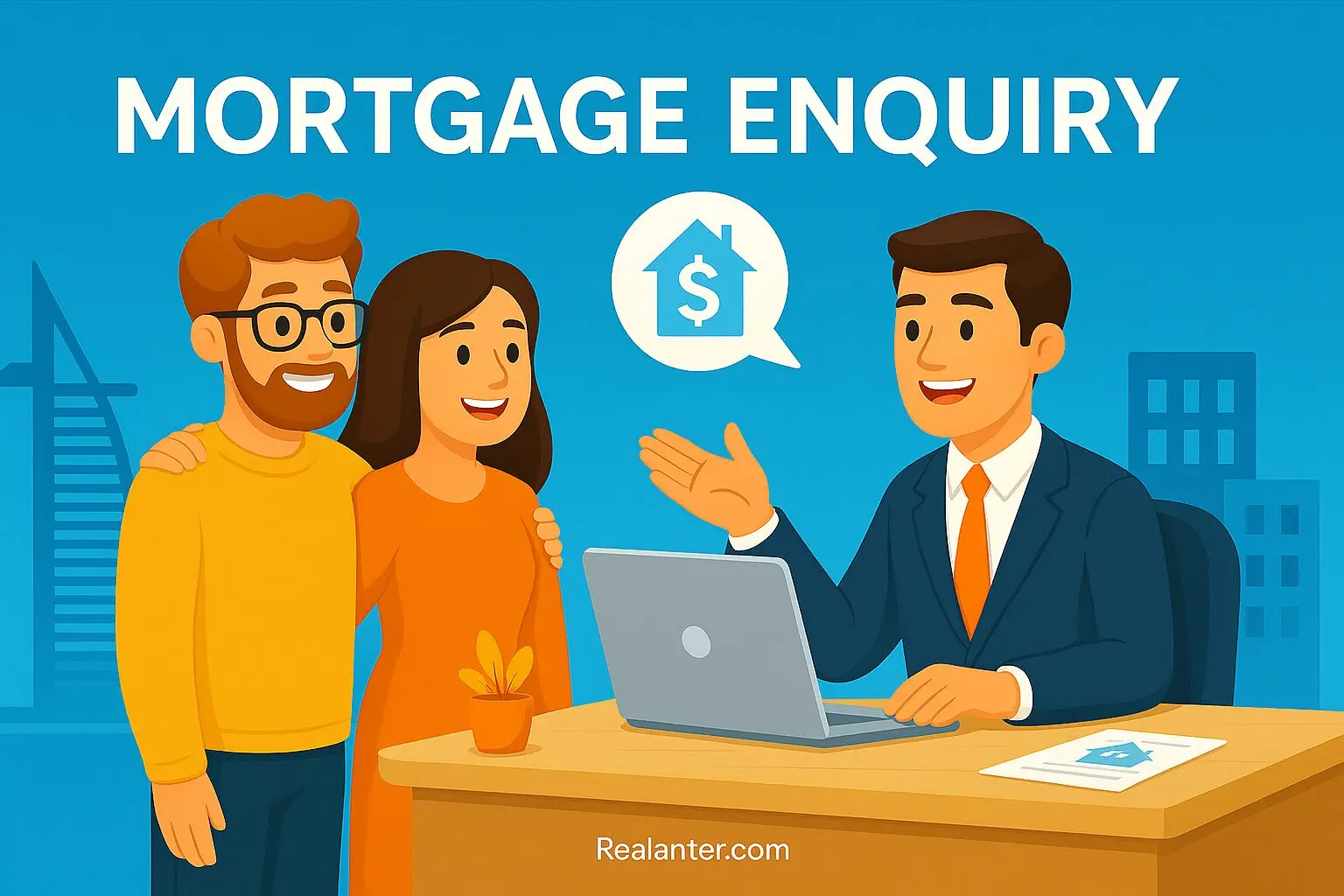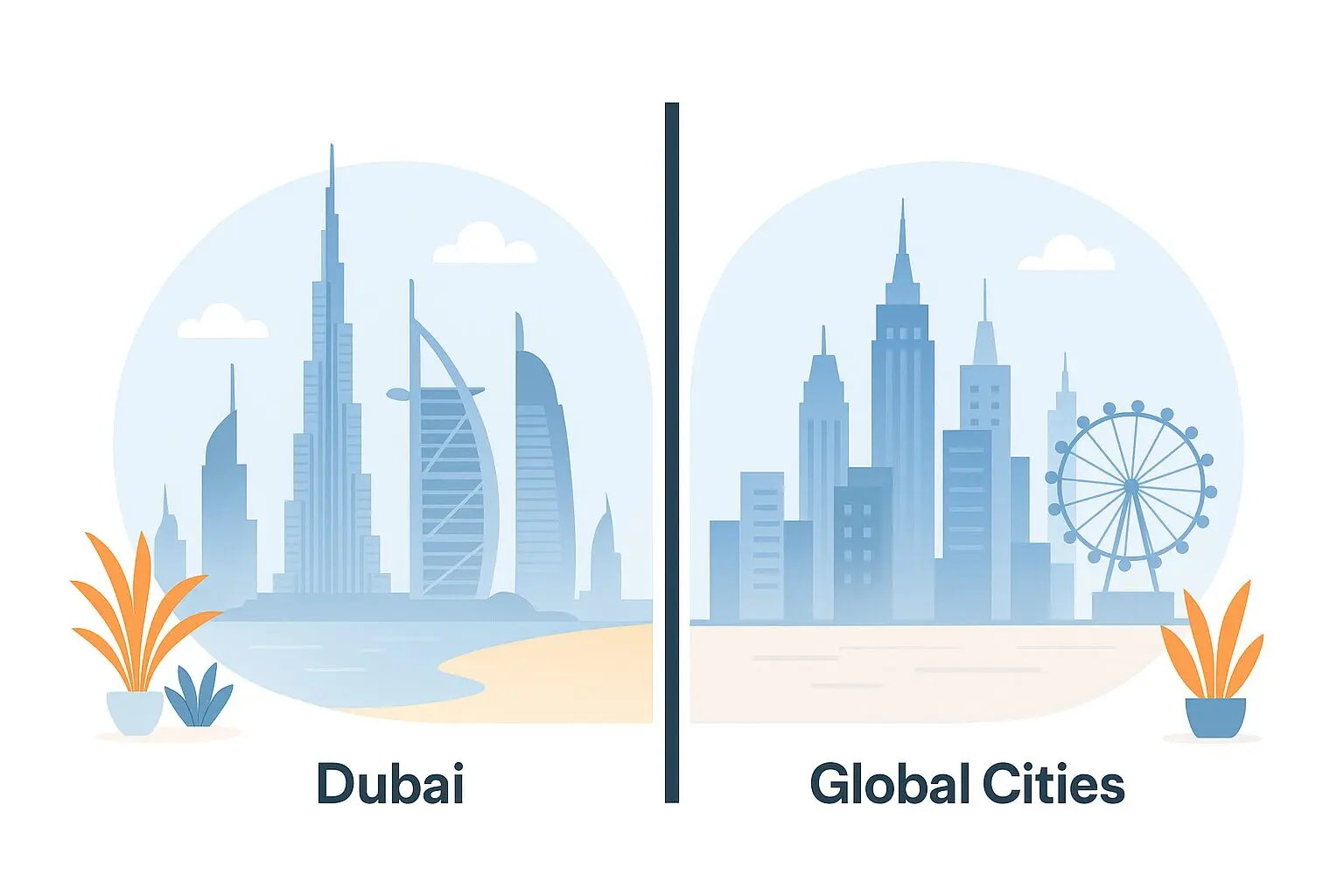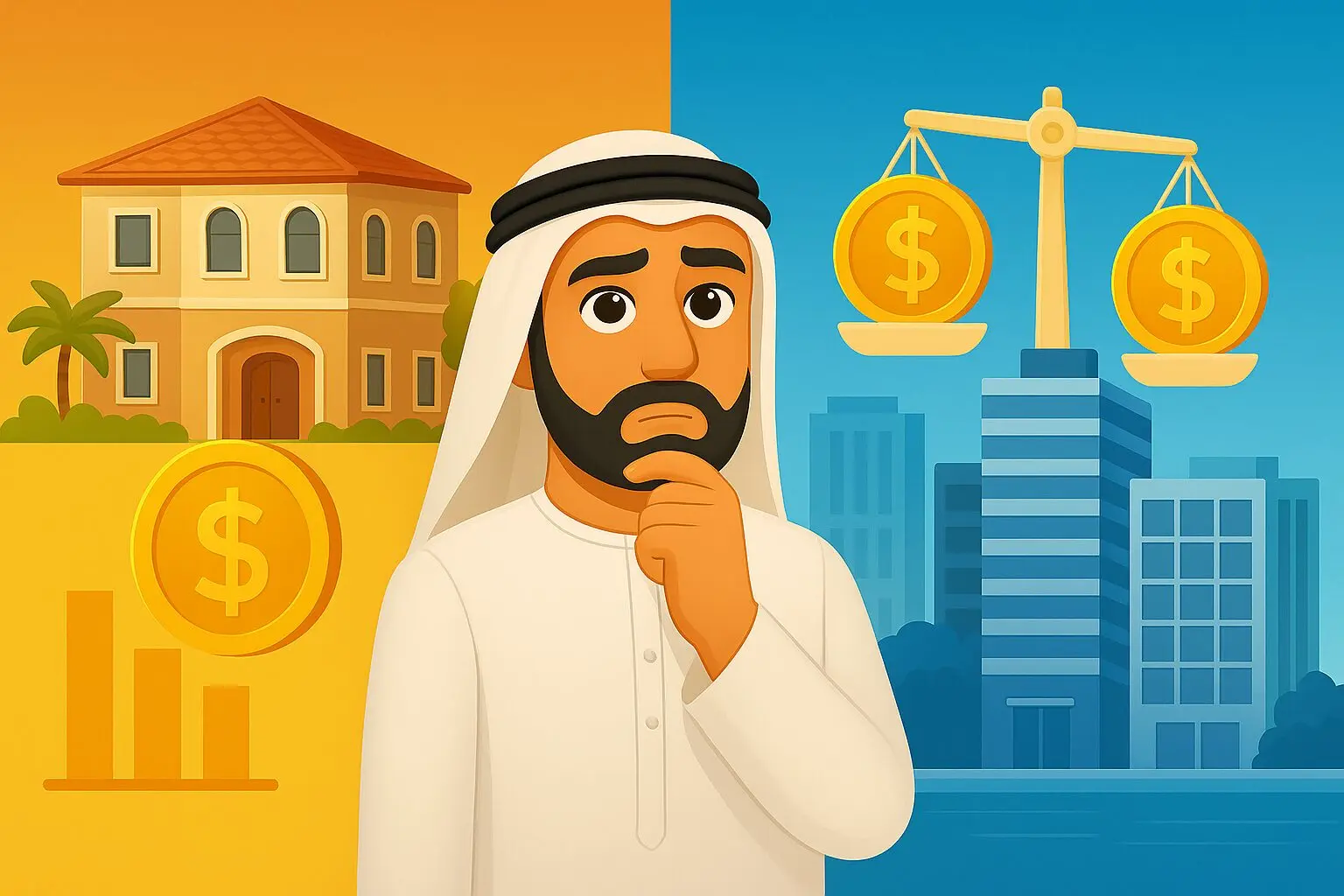But what is fueling this shift? A combination of:
- Adjustments in the post-inflation period by central banks which have global repercussions
- Soaring Foreign Direct Investment (FDI) into Dubai’s real estate.
- Expats purchasing properties to guard against rental inflation spikes in the region.
- Developers increasing off-plan unit availability in collaboration with banks.
The bottom line? Selecting the best mortgage does not simply mean settling on the lowest monthly payment, it influences return on investment (ROI), resale ease, and market liquidity in a volatile environment.
In a volatile environment of over 50 competing local and international banks adjusting interest rates every quarter, a home loan is no longer a homogenous offering. Each single rate, clause, and loan configuration description must be tailored and scrutinized against the borrower’s individual financial blueprint.
A mortgage with a 0.25% difference in interest might not seem significant at first. For instance, over a 25-year period, this can cause an increase or decrease relatively anywhere between AED 75,000 and AED 150,000 depending on the total loan amount. And that’s only for the headline rate. When considering things like Sharia-compliant financing structures, hybrid interest models (fixed and variable periods), and even early repayment penalties, it all becomes so much more intricate.
Why now? Because Dubai’s financial institutions are undergoing transformations. While Dubai’s financial institutions are changing, there are new, more flexible options becoming available, although not all of them are marketed with clarity. This is where truly comprehending the mechanics makes all the difference.
Navigating pre-approval processes as a first-time buyer, transitioning from tenants to homeowners as expatriates, and even managing yield versus capital appreciation for seasoned investors, the year 2025 is more pivotal than ever. Make the right choices with your mortgage, allowing you to reframe the burden of property investment into an engine for wealth.
What to Consider Before Selecting a Mortgage in Dubai
While purchasing a property in Dubai comes with the excitement of homeownership, a seemingly simple financial decision such as a home loan, can turn negative quickly. Here are some of the things that must be considered apart from the Dubai mortgage interest rate.
Fixed vs Variable Interest Rates
For added tranquility, opt for Fixed Rate Mortgages. Your rate, which is usually locked in for one to five years, will not increase during volatile market periods. Ideal for those who want stability in budgeting or expect a rise in interest rates.
Variable Rate Mortgages follow the EIBOR (Emirates Interbank Offered Rate). With a decline in EIBOR, you benefit from a lower rate and reduced repayment amount. However, should it increase, expect an increase in monthly expenditure.
💡Tip: A number of banks are expected to roll out hybrid mortgages around mid-2025, which is predicted to drive popularity. These products combine fixed and variable rates, offering a fixed rate for the first 3 to 5 years and variable afterward, which mitigates risk from potential market downturns.
Islamic vs. Conventional Loans in Dubai
People from all over the world come to live in Dubai for its lifestyle. Therefore, both Sharia compliant Islamic products and conventional non-Islamic products remain in constant demand internationally. Let us look into the comparison chart.
| Loan Type | Key Features | Popular Bank Schemes |
| Islamic Loans (Murabaha, Ijara) | No Interest – Profit Based Model: Because Islam forbids ‘Riba’ or interest, goods are sold to the bank at a profit or lease them out on rental. Profit is earned with Murabaha as well as Ijara. Sharia compliant – must comply with islamic legal and ethical standards approved by a sharia board. Risk Sharing: Emphasizes the shared risk between borrowers and lenders. Asset-Backed: Speculative financing is prohibited with the must fulfill loan being tied to real, tangible assets. Popular among ethically minded borrowers: This is appealing not only to Muslims but also to those looking for ethical banking options. | ADCB Islamic – Provides personal, home, and car Islamic finance through Murabaha and Ijara. Dubai Islamic Bank – The biggest Bank in Sharia Bank in the UAE, offers all types of Loans which are Sharia compliant. |
| Conventional Loans | Interest Based Lending: Fixed or variable interest is charged by banks on the principal amount of the loan taken. This is highly popular Dubai home loan comparison for its simplicity and flexibility. Globally Standardized: It is based on international standards of lending and set benchmarks like LIBOR or SOFR. Enhanced Portfolio Options: Tends to provide broader selections for personal credit lines, refinancing, and unsecured personal loans. No Religious Boundaries: Absence of religious control results in quicker approval and structuring in most cases. Often Associated With Credit Ratings: mortgage interest rates UAE will be different based on the borrower’s credit rating. | Emirates NBD – Grants conventional personal loans, car loans, and best home loans in Dubai at reasonable interest rates and flexible repayment terms. HSBC UAE – Provides loans with multi-national benefits through their international branches. Standard Chartered – Provides bespoke lending services to expatriates and UAE nationals. |
Which Loan Type Should You Choose?
In case adherence to faith is a major deciding factor, then Islamic loans offer lower stress and brand reputation. As cited by S&P Global, Islamic finance assets are anticipated to increase by 10% annually across the GCC, indicating cultural significance and trust from investors.
On the other hand, broader acceptance and flexibility is enhanced with conventional loans, especially for expats or people who need fast-tracked approvals or specialized loans not typically offered under Islamic structures.
Whether investment ethics, religious devotion, or sheer convenience reign as your primary concern, grasping these distinctions allows for strategic decisions in Dubai’s ever-evolving landscape.
Resident vs Non-Resident Mortgage Requirements
Regardless of which mortgage you plan to take; your residency will determine how easy or difficult it is for you to get a mortgage:
Residents of the U.A.E: Were able to enjoy lower down payments, better rates, and much easier refinances exclusively because income verification was streamlineds.
Non-Residents: Most will have to pay 30-40% of the asset’s value upon purchasing and will have to provide bank statements from their respective countries, while also needing to meet much higher documentation requirements. Although, select lenders such as HSBC and Mashreq now provide tailored packages for foreigners that accept global income.
Minimum Salary Criteria
This one challenges a lot of people, especially when they walk into the branch for the first time. Most banks set the benchmark income at a range between 10,000 AED to 20,000 AED monthly.
A few banks offer joint applications that allow partners or spouses to bypass some of the thresholds. For freelancers, consistent historical earnings tend to yield better rates.
💡Tip: RAKBANK and Dubai Islamic Bank within the UAE are known for their low eligibility criteria, so they may be the best choice if your salary is towards the lower end.
Early Repayment Penalties
Refinancing or selling an asset too early can incur penalties, so be sure to check this section in detail. Most banks incur an additional charge of 1% of the remaining loan balance, while some are set free from set rate period caps. Only a few of these lenders provide caps set between 10,000 and 15,000 AED on the amount charged. Some Islamic economic principles impacting early settlements divide profit ratios and principal differently.
If you’re flipping, upgrading, or relocating, these penalties can eat away at your ROI without the need for explicit notice. If you’re dealing with a broker, make sure this is renegotiated upfront.
With the ongoing surge in property prices, using inflation as a broad global touchstone for 2024 and beyond, interest rate dynamics will certainly result in a re-evaluation of mortgage offers. This no longer revolves around headline rates; it includes what each bank offers in terms of flexibility, perks, and value given to financial goals.
Note: We accessed bank sites for listings and incorporated input from brokers to compile offers dated April 2025, as per our banking revisions.
Let us highlight the leading mortgage offers in Dubai for 2025 and summarize key features such as the interest rate, the minimum salary, alongside any unique mortgage perks.
Best 10 Home Loan Offers in Dubai – 2025
Home Loan Comparison Table – UAE Banks
| Bank | Interest Rate (Fixed/Var) | Min Monthly Salary (AED) | Islamic Finance Option | Must Have Benefits |
| Emirates NBD | 3.75% fixed (3 yrs) | 15,000 | ✅ | Free Valuation + Wavier on Part Payment Penalty |
| ADCB | 3.69% variable | 12,000 | ✅ | No Processing Fee |
| HSBC | 3.99% fixed | 20,000 | ❌ | Expats Fast Track + Use of Calculator |
| Mashreq | 3.79% fixed (2 yrs) | 15,000 | ✅ | Salary Account Not Compulsory |
| Dubai Islamic Bank | 3.65% variable (Ijara) | 10,000 | ✅ | Less Equity For Residents |
| RAKBANK | 3.85% fixed (3 yrs) | 12,000 | ❌ | Preapproval Done Within 1 Hr |
| FAB | 3.95% fixed or hybrid | 18,000 | ✅ | Hybrid Option (3 Fixed + Varying Months) |
| Standard Chartered | 4.10% fixed (5 yrs) | 20,000 | ❌ | Insurance On Property Included |
| Noor Bank | 3.70% variable (Murabaha) | 12,000 | ✅ | Sharia Compliant |
| Citibank UAE | 4.25% fixed | 25,000 | ❌ | Free Flexi Repayment |
The other thing that is important to note is that these banks have a wide variety of options that can suit your specific needs. What stands out the most about these deals are the other complimentary bonuses that the banks give, which can be quite helpful depending on your specific needs.
Expert Predictions: Mortgage Trends In Dubai For 2025
To shed light on Dubai mortgages, we have obtained insight from experts in the regions, starting from industry specialists.

Brendan Kennelly, Senior Mortgage Consultant at Mortgage Finder:
“For the first time in many years, a variable rate mortgage could, in some cases, be a cheaper option than a fixed rate mortgage.”
2. Stuart Roe, Head of Mortgage Services at Allsopp & Allsopp:
“Banks still have some good 3-5 year fixed rates well below the current base rates and the reason for this is because there is so much uncertainty in short-term rates at the moment.”
Which Mortgage is Best? Customized Guidance According By Buyer Category
The optimal financing choice for a mortgage loan is highly dependent on your individual circumstances and objectives. Here is segmentation of the best options based on buyer profiles regardless if you are a new purchaser, an investor, or looking for Sharia-compliant options:
Recommended For New Purchasers
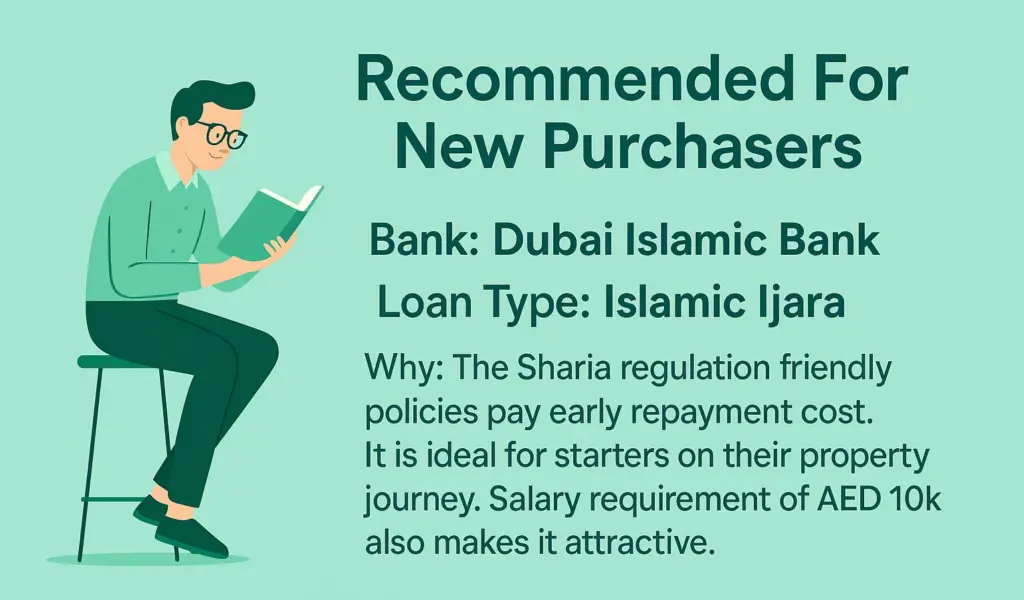
Bank: Dubai Islamic Bank
Loan Type: Islamic Ijara
Why: The Sharia regulation friendly policies pay early repayment cost. It is ideal for starters on their property journey. Salary requirement of AED 10k also makes it attractive.
Expert Quote: “Lower-commitment Islamic products tend to be better for young buyers considering long-term stay in an area. It has the rental type flexibility that comes with residency uncertainty.”
Fatima Al-Habib, Legal Advisor, Dubai Property Law Group
Best for Expats
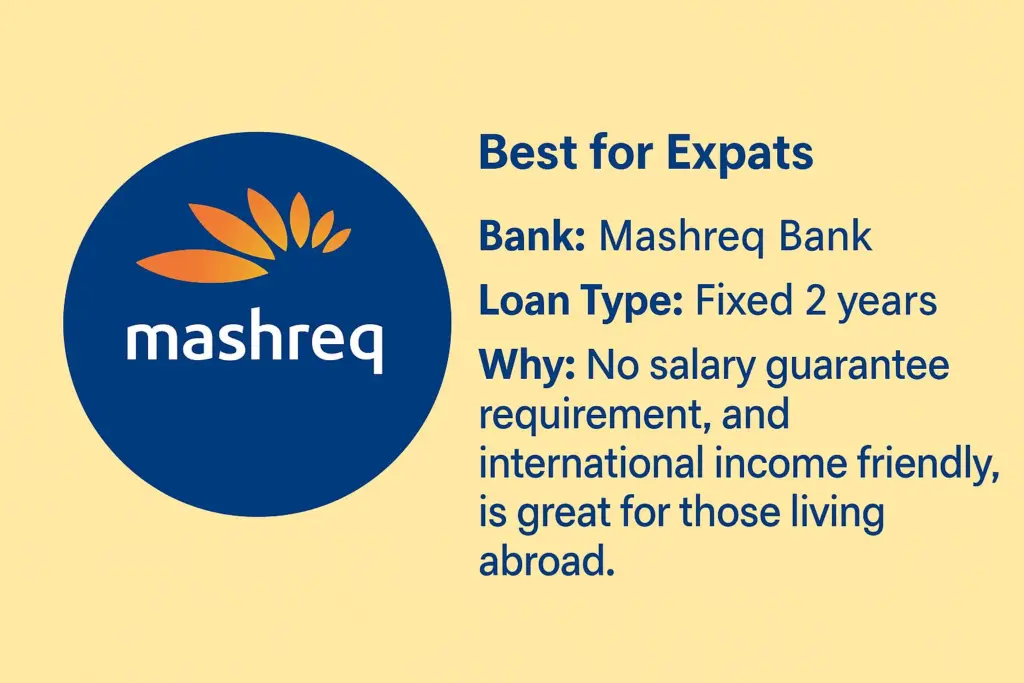
Bank: Mashreq Bank
Loan Type: Fixed 2 years
Why: No salary guarantee requirement, and international income friendly, is great for those living abroad.
Best for Investors & Flippers
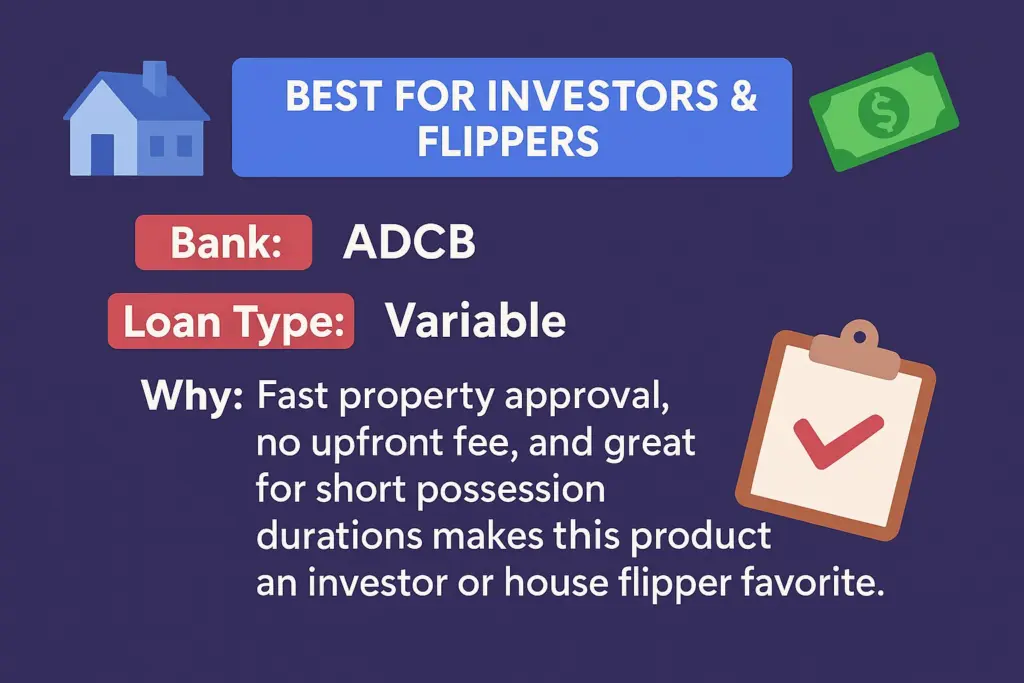
Bank: ADCB
Loan Type: Variable
Why: Fast property approval, no upfront fee, and great for short possession durations makes this product an investor or house flipper favorite.
Best for Islamic Finance Seekers
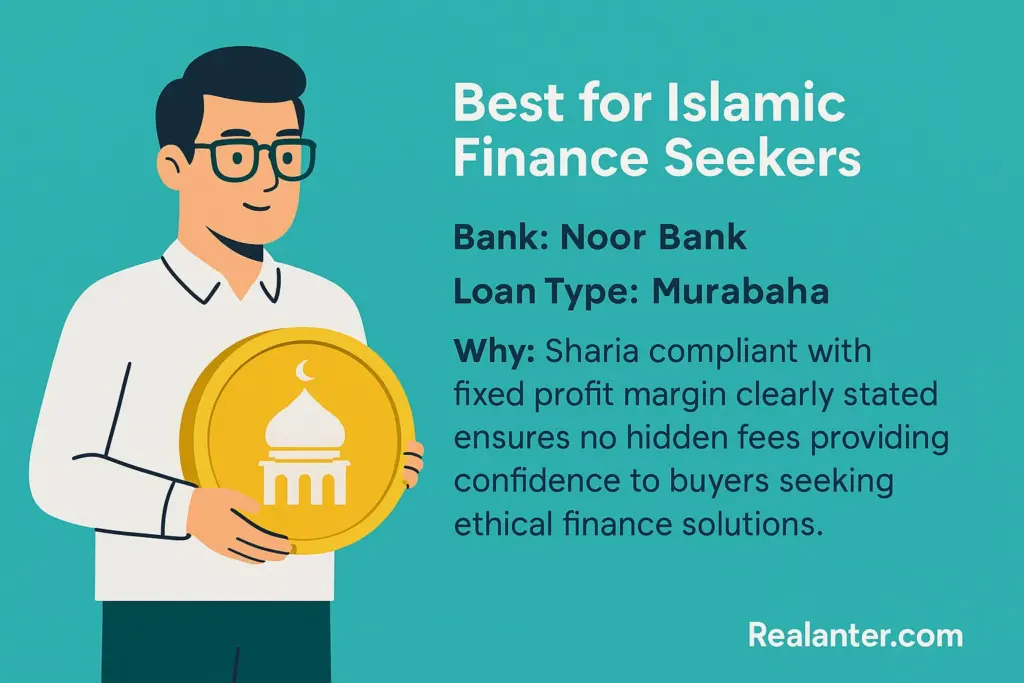
Bank: Noor Bank
Loan Type: Murabaha
Why: Sharia compliant with fixed profit margin clearly stated ensures no hidden fees providing confidence to buyers seeking ethical financ solutions.
Expert Quote
“Depending on the structure, Islamic mortgages can compete with conventional loans and at times be even cheaper which a surprise too many buyers is.”
Omar Al-Ketbi, Sharia Finance Consultant
Best For Residents Earning Lower Salary
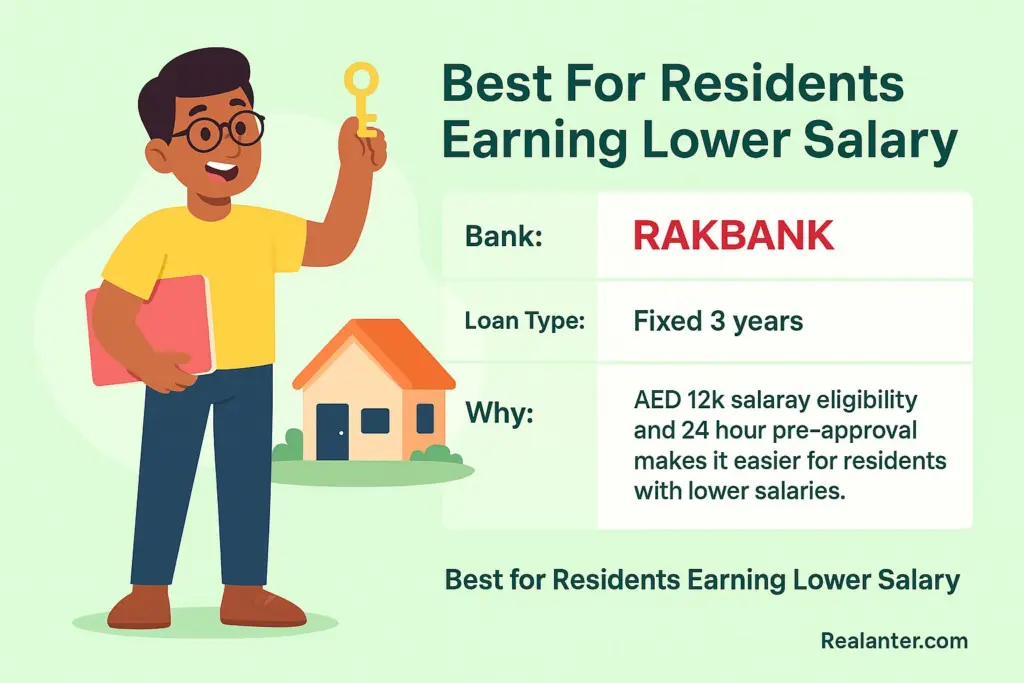
Bank: RAKBANK
Loan Type: Fixed 3 years
Why: AED 12k salary eligibility and 24 hour pre-approval makes it easier for residents with lower salaries.
Top Tools To Make Your Search Easier
As solving the puzzle finding the right mortgage doesn’t require only picking the best deal – the right tools will help make better decisions.
- Estimation Of Monthly Payments Bayut Mortgage Calculator
- Bayut Mortgage Calculator
- Mashreq Instant Pre-Approval
- Compareit4me UAE Mortgage Comparison
The suggestions above illustrate the entirety process and help you need to match your mortgage strategy with your personal plans. In Dubai, be it a first expat home loans UAE or for an investor, knowing what options are available and identifying rating the features that are most important helps.
FAQs – Questions of Mortgages in Dubai
It is possible; however, you will usually need to make a 30-40% down payment and show a steady foreign income. Some banks may also require additional documentation.
A lot of consultants believe that for the first 2-3 years, it is better to opt for a fixed rate. After that, you can reevaluate and possibly refinance depending on market conditions.
Yes, early settlement fees are often negotiable. Some banks eliminate these fees after the first five years, so ask about it during the loan discussions.
Not every case. Mashreq and FAB do not require a salary transfer to offer a loan which can be helpful to people with other income.
Yes, off-plan properties can be financed, however, ensure that the bank you go with has a partnership with the property’s developer.

